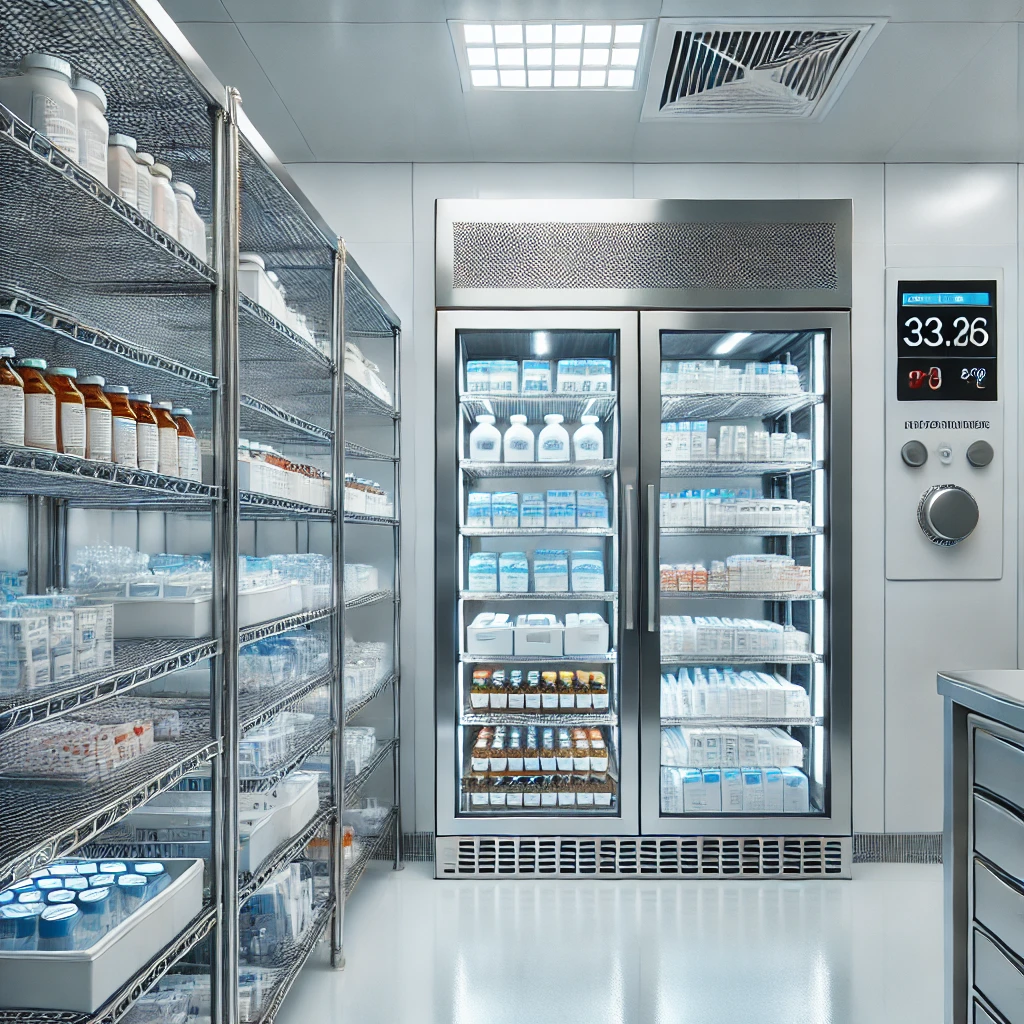Pharmaceutical Cold Room Solutions
Why Cold Rooms are Crucial for the Pharmaceutical Industry
Pharmaceutical products, including vaccines, medications, and biologics, require stringent temperature control to ensure their efficacy and safety. Cold room solutions in the pharmaceutical industry are designed to maintain the stability, potency, and integrity of these products, preventing spoilage or degradation due to temperature fluctuations. Whether storing vaccines that require sub-zero temperatures or medications that need consistent cool conditions, pharmaceutical cold rooms are an indispensable part of modern healthcare logistics.
By utilizing cold room solutions, pharmaceutical companies can ensure that their products meet regulatory requirements, extend shelf life, and maintain safety for patients. Cold rooms also allow for the safe storage and transportation of temperature-sensitive products, ensuring that pharmaceutical products are delivered in the best condition possible.
Key Benefits of Pharmaceutical Cold Room Solutions
Pharmaceutical cold rooms are designed to provide an environment where temperature, humidity, and airflow are precisely controlled. This not only preserves the integrity of the products but also ensures compliance with international standards for pharmaceutical storage. Below are some of the major benefits of using cold rooms in the pharmaceutical industry:
- Strict Temperature Control: Pharmaceutical cold rooms provide precise temperature regulation, typically between -20°C and +8°C (-4°F to 46°F), depending on the product. This ensures that sensitive medications and vaccines are kept at the ideal temperature, preventing loss of potency or degradation.
- Humidity Management: Cold rooms maintain optimal humidity levels to prevent the buildup of moisture, which can cause products to degrade or become contaminated. Humidity control is essential for ensuring product safety and efficacy.
- Compliance with Regulatory Standards: Cold rooms are designed to comply with Good Manufacturing Practices (GMP) and Good Distribution Practices (GDP), ensuring that pharmaceutical products meet the necessary quality and safety standards.
- Secure and Safe Storage: Pharmaceutical cold rooms provide secure environments, often featuring backup power systems, alarms, and monitoring tools to ensure continuous operation. This helps prevent temperature excursions, which could lead to product loss.
- Reduced Waste: By providing consistent and reliable cold storage, pharmaceutical cold rooms significantly reduce the risk of product spoilage or loss, leading to reduced waste and financial savings for manufacturers and distributors.
- Real-Time Monitoring: Advanced cold room solutions come with real-time monitoring systems that continuously track temperature and humidity levels. These systems alert operators if there are any deviations, allowing for immediate action to be taken to protect the integrity of the products.

Technical Benefits of Pharmaceutical Cold Room Solutions
Pharmaceutical cold rooms are equipped with state-of-the-art technologies that ensure the most stringent conditions for sensitive products. These features are designed to provide optimal storage conditions while enhancing operational efficiency. Some of the technical advantages include:
1. Precision Temperature Control
Cold rooms allow for precision temperature control, typically between -20°C and +8°C (depending on the product), to ensure medications, vaccines, and biological samples are stored in optimal conditions. This prevents product degradation or the loss of efficacy due to temperature fluctuations.
2. Advanced Monitoring Systems
Cold rooms are equipped with advanced monitoring systems that track temperature and humidity levels in real-time. These systems automatically alert personnel if conditions deviate from the set parameters, ensuring immediate corrective action to avoid damage to sensitive products.
3. Backup Power Systems
Pharmaceutical cold rooms feature backup power systems that ensure continuous cooling in the event of a power outage. This is critical for preventing temperature excursions and maintaining the quality of the stored products.
4. Energy Efficiency
Modern pharmaceutical cold rooms are designed with energy-efficient cooling systems that maintain optimal storage conditions while minimizing energy consumption. This not only reduces operational costs but also supports sustainability efforts.
5. Compliance with International Standards
Pharmaceutical cold rooms are built to meet international standards such as Good Manufacturing Practices (GMP) and Good Distribution Practices (GDP). This ensures that pharmaceutical companies comply with regulatory requirements, avoiding potential legal and financial penalties.
Step-by-Step Process for Using Cold Rooms in the Pharmaceutical Industry
- Design and Installation: Pharmaceutical cold rooms are designed to meet the specific temperature and storage requirements of various medications, vaccines, and biological samples. High-quality insulation, cooling systems, and monitoring tools are installed to ensure optimal conditions.
- Loading and Storage: Once the cold room is ready, pharmaceutical products are loaded in a way that allows for proper airflow and even temperature distribution. Specialized shelving and racks may be used to optimize space and ensure that products are easily accessible.
- Monitoring and Adjustments: The cold room’s monitoring system continuously tracks the temperature and humidity levels. If there are any deviations from the set parameters, immediate adjustments are made to prevent product degradation.
- Regular Maintenance: Pharmaceutical cold rooms require routine maintenance, including cleaning, calibration of temperature sensors, and checking refrigerant levels. This ensures that the cold room continues to operate at peak efficiency and maintains the required storage conditions.
The Future of Cold Room Technology in the Pharmaceutical Industry
As the pharmaceutical industry continues to evolve, cold room technology will play a crucial role in ensuring the safety and efficacy of medications, vaccines, and biological products. Advancements in energy-efficient cooling systems, automation, and real-time monitoring will enable pharmaceutical companies to store products under even more precise conditions, reducing the risk of spoilage or degradation.
With the growing demand for temperature-sensitive products, cold room technology will become an integral part of the pharmaceutical supply chain. Companies that invest in modern cold room solutions will be better equipped to meet the challenges of regulatory compliance, operational efficiency, and product safety, ensuring that they remain competitive in an increasingly complex industry.
